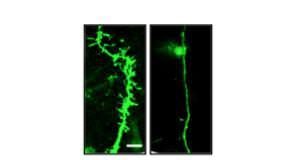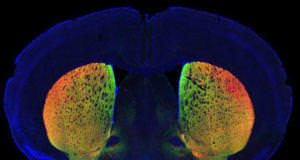How Stress And Depression Can Shrink The Brain
Major depression or chronic stress can cause the loss of brain volume, a condition that contributes to both emotional and cognitive impairment. Now a team of researchers led by Yale scientists has discovered one reason why this occurs -- a single genetic switch that triggers loss of brain connections in humans and depression in animal models.
Consuming Flavanol-Rich Cocoa May Enhance Brain Function
Eating cocoa flavanols daily may improve mild cognitive impairment, according to new research in the American Heart Association's journal Hypertension. Each year, more than six percent of people aged 70 years or older develop mild cognitive impairment, a condition involving memory loss that can progress to dementia and Alzheimer's disease.
‘Mini’ Stroke Can Cause Major Disability, May Warrant Clot-Busters
A transient ischemic attack, TIA or a "mini stroke," can lead to serious disability, but is frequently deemed by doctors too mild to treat, according to a study in the American Heart Association journal Stroke.
Mini-Strokes Leave ‘Hidden’ Brain Damage
Each year, approximately 150,000 Canadians have a transient ischemic attack (TIA), sometimes known as a mini-stroke. New research published January 28 in Stroke, the journal of the American Heart Association shows these attacks may not be transient at all. They in fact create lasting damage to the brain.
Clenching Left Hand Could Help Athletes Avoid Choking Under Pressure
Some athletes may improve their performance under pressure simply by squeezing a ball or clenching their left hand before competition to activate certain parts of the brain, according to new research published by the American Psychological Association.
Tai Chi Increases Brain Size, Benefits Cognition In Randomized Controlled Trial...
Scientists from the University of South Florida and Fudan University in Shanghai found increases in brain volume and improvements on tests of memory and thinking in Chinese seniors who practiced Tai Chi three times a week, reports an article published June 19 in the Journal of Alzheimer's Disease.
Melatonin And Exercise Work Against Alzheimer’s In Mice
The combination of two neuroprotective therapies, voluntary physical exercise, and the daily intake of melatonin has been shown to have a synergistic effect against brain deterioration in rodents with three different mutations of Alzheimer's disease.
Chewing Ability Linked To Reduced Dementia Risk
Can you bite into an apple? If so, you are more likely to maintain mental abilities, according to new research from Karolinska Institutet in Sweden. The population is aging, and the older we become the more likely it is that we risk deterioration of our cognitive functions, such as memory, decision-making and problem solving. Research indicates several possible contributors to these changes, with several studies demonstrating an association between not having teeth and loss of cognitive...
Exercise The Body To Keep The Brain Healthy, Study Suggests
People who exercise later in life may better protect their brain from age-related changes than those who do not, a study suggests.Researchers found that people over 70 who took regular exercise showed less brain shrinkage over a three-year period than those who did little exercise.
Challenging Parkinson’s Dogma: Dopamine May Not Be The Only Key Player...
Scientists may have discovered why the standard treatment for Parkinson's disease is often effective for only a limited period of time. Their research could lead to a better understanding of many brain disorders, from drug addiction to depression, that share certain signaling molecules involved in modulating brain activity.
Diabetes Raises Levels Of Proteins Linked To Alzheimer’s Features, Study Finds
Growing evidence suggests that there may be a link between diabetes and Alzheimer's disease, but the physiological mechanisms by which diabetes impacts brain function and cognition are not fully understood. In a new study published in Aging Cell, researchers at the Salk Institute for Biological Studies show, for the first time, that diabetes enhances the development of aging features that may underlie early pathological events in Alzheimer's.
Omega-3 Intake Heightens Working Memory in Healthy Young Adults
While Omega-3 essential fatty acids -- found in foods like wild fish and grass-fed livestock -- are necessary for human body functioning, their effects on the working memory of healthy young adults have not been studied until now.

















